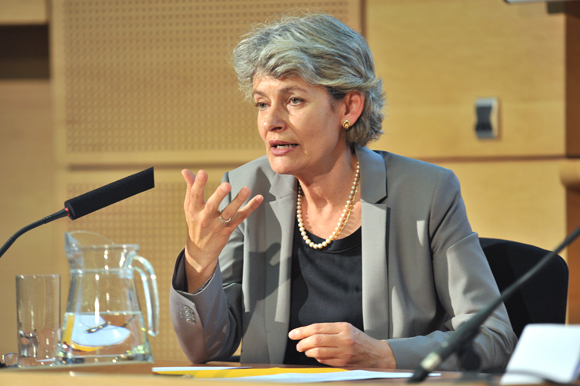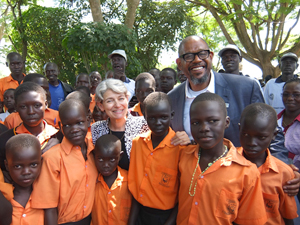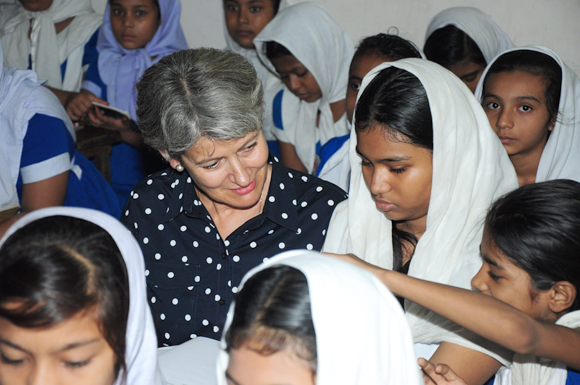Interview by Sturla Bjerkaker

© UNESCO
Irina Bokova has been the Director-General of UNESCO since November 2009. She is the first woman to lead the organisation. Ms Bokova has served as Bulgaria’s Secretary of State for European Integration, Minister of Foreign Affairs, Ambassador to France and Monaco and Permanent Delegate to UNESCO, among other positions. She has been actively engaged in international efforts to advance quality education for all, gender equality, human rights, cultural dialogue and scientific cooperation. She also serves as Executive Secretary of the Steering Committee of the UN Secretary-General’s Global Education First Initiative.
Global Citizenship Education is at the core of UNESCO’s priorities. That is why Adult Education and Development wanted to present a portrait of Director-General Irina Bokova. Education must be more than transmitting information and knowledge, she says in this interview with Sturla Bjerkaker.
Irina Bokova, you were 28 years young when you went to Copenhagen to attend the UN conference on equality for women. How did this experience infl uence your further development?
In fact, I attended the World Conferences on Women in Copenhagen, Nairobi and Beijing. Something unprecedented was happening on the world stage – the result of struggles carried out over decades. The struggles concerned things like the right to vote, access to education, greater participation in political life, equal pay for equal work and more. Those three conferences gave the cause of women’s rights a universal dimension. They affirmed that social justice, peace and development can only happen when women enjoy the same rights as men.
How this influenced my own development? It strengthened my sense of responsibility to promote human rights and gender equality in whatever function I held, and to understand that, whatever the cultural, historical and political context, one has to find the right channels and arguments to facilitate change without imposing it. Social transformation is a gradual process grounded in universal human rights and the right of every person to development. There is still a long way to go before Planet 50/50 becomes a reality.
What other events have had a special impact on your choices in life?
I come from Bulgaria, a country with a heritage that bears witness to the flourishing of ancient civilizations, marked by great artistic creativity, and rich cultural and economic exchanges. One of the best examples is the Thracian civilization, a powerful kingdom that forged a unique identity through exchanges with Greeks, Persians, Macedonians and Scythians. It was a bridge between cultures in Europe and beyond. Jumping forward in history, our medieval heritage is considered to be a predecessor of the European renaissance. Our identity is made up of all these layers, a mosaic of peoples and cultures and there are as many bridges to be built across cultures and countries today as it was back in the Thracian days. This is why I believe the destruction we are now witnessing of cultural heritage in Syria and Iraq represents a tragic loss for all humanity.
You grew up in an environment where Muslims and Christians had lived together?
Yes, for centuries. Our daily lives and customs were intertwined. Early on, partly thanks to some wonderful teachers, I developed what became a lifetime passion for history and archaeology, spending many summer as a volunteer on archaeological digs.
When and how did you connect to a bigger world?
My family placed great value on education as the foundation for standing on one’s own feet and having the freedom to make choices. I saw my mother pursue her studies as an adult and become a radiologist. They expected me to work hard and do well. This came with a strong sense of social justice and responsibility, especially towards the most vulnerable. It included a conviction that one can drive change – this is a message that I always share with youth. As a parliamentarian, a minister and a diplomat, I participated in the drafting of my country’s constitution after the fall of the Berlin Wall and facilitate integration in the European Union. In this the promotion of inclusion, dialogue, human rights and protection of minorities have always been my guiding principles. Already when young, I was exposed to music and art, to foreign languages and literature. All this nourished my curiosity, my inner world and my conviction that cultural expressions are formidable channels for mutual understanding, tolerance and social cohesion.

Irina Bokova with UNESCO Special Envoy for Peace and Reconciliation Forest Whitaker in the city of Yei, South Sudan, © UNESCO
How did you come to work for UNESCO?
From my earliest days, I have been involved in international affairs, working for my country during a fascinating period of historical transition, through the active promotion of European integration. In the Constitution of UNESCO, I found a document of extraordinary vision that remains as relevant as ever. I became Ambassador to UNESCO in 2005, and elected as Director-General in 2009, running on a platform of new humanism in today’s globalised and interdependent world.
UNESCO is focusing on Global Citizenship Education (GCED). Great. How do you defi ne and describe Global Citizenship Education?
Our focus on global citizenship is based on two things. First it is a part of a new vision of education, which UNESCO is helping to forge for the new post-2015 development agenda. Second, it is a pillar of the Global Education First Initiative, launched by the United Nations Secretary General in 2012. Global citizenship must be at the heart of the education we need for the 21st century to build a more peaceful and sustainable future for all, based on shared values. To reach this, education must be more than transmitting information and knowledge. This is the spirit of global citizenship education: to nurture new values, knowledge and skills about peace, sustainable development, human rights and democracy, to transform these into daily behaviours for tolerance and respect.
UNESCO here seems to put emphasis on child and youth education. What will be the strategies to implement GCED in the curricula of schools?
There is no doubt that schools – regardless of the age of learners – are the best places to provide the competencies for learning together and skills to help get engaged in positive change, both locally and globally. This means that an education system should equip learners with the ability to nurture their potential and live a meaningful life. How a specific government integrates GCED in the curriculum can vary widely. Some countries have developed GCED as an approach across all areas of learning and consolidated related curricula. Others have opted to implement it as part of an existing subject such as civic education and social and environmental studies. In this respect, UNESCO’s role is to provide guidance in tackling some structural and pedagogical challenges. This is why we are producing a Guiding Framework on Global Citizenship Education.
In what ways does UNESCO intend to stimulate and influence GCED in and by its Member States?
We are playing our role as a laboratory of ideas to highlight the importance of global citizenship. We are conducting international consultations on GCED to share best practices and help countries in spearheading this approach within education systems, through policies and teaching practices. UNESCO is developing a clearinghouse on GCED in partnership with the Asia Pacific Centre of Education for International Understanding to share knowledge and understanding of GCED. This follows the organisation of the Forum on Global Citizenship Education in Bangkok 2013, and the UNESCO Forum on Global Citizenship Education in Paris 2015.
How can adult learning and education (ALE) get space in this context and what would you say is the role of ALE?
We see ALE as a vital aspect of lifelong learning – this is more than technical and vocational education and training, going beyond the walls of classrooms, to take in non-formal and informal learning situations. This perspective is crucial for all forms of GCED. In these turbulent times, especially young adults require the skills to cope with rapid change. New technologies are creating broad opportunities, but also raising steep challenges and new divides. This is why lifelong learning must be about giving every human being the competence to live in a world under pressure. GCED is not something that should only be directed to future generations – we need it now to empower today’s citizens with the skills to deal with our very complex world.
You have been active and engaged in civil society. How do you see the roles of NGOs and civil society organisations in the coming efforts to strengthen GCED?
UNESCO is engaged in an ambitious effort to strengthen ties with NGOs. Since its origin, UNESCO was linked to a wide network of intellectuals, academics, artists and civil society actors who played a decisive role in promoting our mandate. The relationship with NGOs is an essential driver of our action

Irina Bokova with students at a school in Dhaka, Bangladesh, © UNESCO
on GCED. First, UNESCO is associated with NGOs to develop and implement GCED-linked programmes. In areas such as literacy, human rights education and education for sustainable development, many NGOs have developed innovative approaches that deserve to be recognised and integrated in the implementation of GCED. NGOs also carry the voice of UNESCO and its messages to the public that we cannot reach directly. Second, UNESCO encourages governments and the private sector to work with NGOs to improve educational policy, to mobilise communities and public opinion in favour of the right to education, to promote intercultural dialogue and mutual understanding. Education is public responsibility, but also a societal one.
The socio-emotional dimension of GCED – writes UNESCO – is to have a sense of belonging to a common humanity, sharing solidarity and respect for differences and diversity. Is this a far too idealistic approach in these days, or how could GCED contribute?
Intercultural dialogue and mutual understanding are essential parts of GCED, and more fundamentally, the best response to extremism that distorts religion and seeks to divide. More than ever, we need a renewed commitment by all to dialogue, to tolerance, reconciliation and understanding. GCED can provide the resources to teach people to live and grow together, sharing experiences and values.
In fact, we cannot promote GCED without nurturing new forms of “cultural literacy” – understanding and learning about the richness of our own culture as well as of others.
Last, but not least Irina Bokova: How could the global adult learning and education community contribute?
We are at a turning point this year. To move forward we must integrate global citizenship education in the post-2015 agenda and support states in building it throughout their education systems. This was the conclusion of the Forum on Global Citizenship Education last January that attracted record participation and generated intense exchanges on teaching, learning, youth engagement and community involvement. In this sprit, we need to support adult community-based learning and education to alert people outside the formal education system, especially through use of ICT and social media, to the importance of integrating GCED as a crucial element of this new education agenda.

DVV International operates worldwide with more than 200 partners in over 30 countries.
To interactive world map